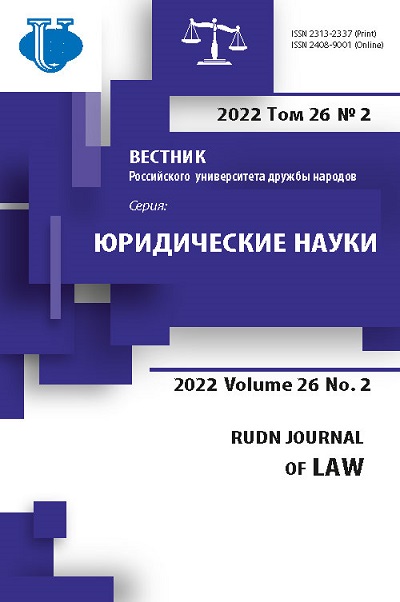Enrico Ferri on the criminal process
- Authors: Trefilov A.A.1
-
Affiliations:
- Higher School of Economics
- Issue: Vol 26, No 2 (2022)
- Pages: 433-447
- Section: PROCEDURAL LAW. PROSECUTOR SUPERVISION
- URL: https://journals.rudn.ru/law/article/view/31093
- DOI: https://doi.org/10.22363/2313-2337-2022-26-2-433-447
- ID: 31093
Cite item
Abstract
The article examines the views of the outstanding Italian criminologist Enrico Ferri on various issues of criminal justice, expressed in “Criminal Sociology”. It analyzes his arguments concerning the goals of justice, stability of the criminal code, the need for unity of civil and military justice. The article offers counterarguments against Enrico Ferri’s list of exceptions to the principle of the presumption of innocence. At the same time the views of the thinker concerning the expediency of abandoning the principle of collegiality and the jury trial are of certain interest. His ideas on three types of sentences (acquittal, indictment and under suspicion) and on the need to reason the final act of justice have been considered. Enrico Ferri’s thoughts on the amnesty and pardon, rehabilitation, revision of acquittals, possibility of stricter sentence in verification proceedings, etc. are obviously enriching the science of the criminal process. This article may be of interest to anyone who is engaged in the issues of criminal procedure, criminal law, and criminology, as well as the history of these legal sciences.
About the authors
Aleksandr A. Trefilov
Higher School of Economics
Author for correspondence.
Email: trefilovaa1989@gmail.com
ORCID iD: 0000-0001-7086-9850
Candidate of Legal Sciences, Associate Professor, Department of Judicial Systems and Criminal Law of the Faculty of Law
20 Myasnitskaya str., Moscow, 101000, Russian FederationReferences
- Barzilai, S. (1883) La recidiva e il metodo sperimentale: Appunti critici sulla “Recidiva nei reati” dell’avvocato Giuseppe Orano. Roma, Mantellate.
- Beccaria, C. (2004) On Crimes and Punishments. Indianapolis, Bobbs-Merrill.
- Brun, M. (2011) Der Untersuchungsbefehl im Militärstrafprozess. Luzern. Available at: https://www.unilu.ch/fileadmin/fakultaeten/rf/institute/staak/MAS_Forensics/dok/Masterarbeiten_MAS_3/Brun_Marcel.pdf
- Lombroso, C. (2020) The latest advances in criminal science. Anarchists: monograph. Moscow: INFRA-M Publ. (in Russian).
- Barabanov, P.K. (2019) Criminal Procedure in Italy. Moscow, Sputnik+ Publ. (in Russian).
- Donatsch, A., Hansjakob, T., Lieber, V., & Summers, S. (2014) Kommentar zur Schweizerischen Strafprozessordnung (StPO). Zürich, Schulthess Verlag.
- Dril, D.A. (2010) Crime and Criminals. The Doctrine of Crime and Measures to Combat it. Moscow: INFRA-M Publ. (in Russian).
- Ferry, E. (2009) Criminal Sociology. Moscow: INFRA-M Publ. (in Russian).
- Ferry, E. (1908) Criminal Types in Art and Literature. Saint Petersburg, E. Korenev & Co Publ. (in Russian)
- Ferry, E. (1906) Socialism and Positive Science. Translation by L. Istomin. Saint Petersburg, V.D. Korchagin Publ. (in Russian)
- Gabriel de Tarde (2009) Crime and Criminal. Comparative Crime. Mob Crimes. Moscow: INFRA-M Publ. (in Russian)
- Golovko, L.V. (ed.) (2020) Judiciary and Law Enforcement Agencies. Moscow, Gorodets Publ. (in Russian)
- Endoltseva, A.V. & Podustova, O.L. (2021) Providing compensation to the victim for the harm caused by crime during preliminary investigation. Moscow: Yurlitinform Publ. (in Russian)
- Koni, A.F. (2006) Moral Principles of the Criminal Process. Moscow: SGU Publ. (in Russian)
- Kuznetsova, N.F. & Luneev, V.V. (eds.) (2004) Criminology: textbook for university students. Moscow, Wolters Kluwer Publ. (in Russian).
- Liszt, Franz von (1900) Lechrbuch des deutschen Strafrechts. Berlin, J. Guttentag.
- Lutz, Meyer-Goßner (2008) Strafprozessordnung: StPO, Kommentar, München, C.H. Beck.
- Poznyshev, S.V. (2009) Criminal Psychology. Criminal Types. On the psychological study of personality as a subject of behavior in general and on the study of the personality of a criminal in particular. Moscow: INFRA-M Publ. (in Russian)
- Russo, Zhan-Zhak (1969) Treatises. Moscow, Nauka Publ. (in Russian).
- Serebrennikova, A.V. (2017) Do we need a moratorium on amendments to the Criminal Code of the Russian Federation: posing the question. Russian Investigator. 5, 21-26. (in Russian).
- Shostak, M.A. (2008) Criminal Process. Minsk, BSU. (in Russian).
- Sluchevsky, V.K. (2014) Textbook of Russian Criminal Procedure. Introduction. Part I: Judiciary. Moscow: Zertsalo-M Publ. (in Russian).
- Trefilov, A.A. (2020) Criminal Procedure of Foreign Countries. Moscow, Voskhod-A Publ. (in Russian).
Supplementary files















